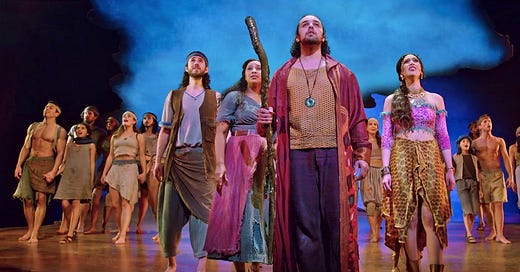Review: The Prince of Egypt: The Musical (dir. Scott Schwartz, 2023)
A much more complex, nuanced take on Moses' relationships with Rameses and God.

Released in 1998, The Prince of Egypt was the first successful Bible epic to hit the big screen since the genre’s heyday in the 1950s and early ’60s. It was also, for about a year and a half, the top-grossing non-Disney animated film of all time. This month marks its 25th anniversary, and a new, expanded, stage-musical version of the story became available to rent or own digitally this week.
I covered the original film extensively when it first came out—from film reviews for the local papers to an essay on Moses movies for Bible Review—and I wrote a detailed essay about the making of the film five years ago. It was during my research for the latter essay that I first learned about the stage musical, which premiered in California in 2017.
The stage musical eventually went to one of London’s West End theatres in 2020, and this week’s digital release is based on that production. I had a chance to watch the show a few weeks ago, so I figured I’d type up a few thoughts. I’m grouping them by topic below.
-
Authorship. It is tempting to say that, with this stage musical, songwriter Stephen Schwartz has finally made The Prince of Egypt his own. He was a huge part of the original movie, of course—the directors have talked about how his demo tape for the opening song, ‘Deliver Us’, set the tone for the project as a whole—but the film had many authors and was trying to serve many audiences.
On the author side, you had:
DreamWorks co-founder Jeffrey Katzenberg, who had just left Disney and wanted to outdo his former bosses by making the most epic animated movie ever, and whose involvement in every aspect of the film got so intense that the filmmakers joked he was the film’s “personal trainer”.
Fellow co-founder Steven Spielberg, who said the studio’s first movie should be a remake of The Ten Commandments, and who by all accounts had a lot of input into the look, feel, and content of the film.
Three official co-directors: Simon Wells, Steve Hickner, and Brenda Chapman—the last of whom became, with this project, the first woman ever to direct a major American animated film.
Screenwriter Philip LaZebnik, who got an assist from Nicholas Meyer.
Composer Hans Zimmer, who wrote the movie’s score and orchestrated the songs.
Stephen Schwartz, who wrote six songs for the film.
And on the audience side, you had a legion of consultants from all three Abrahamic faiths, representing the various sects within Judaism, Christianity, and Islam.
All of these people had some say in how the film turned out, and that meant they had some say in the songs, too. Schwartz has talked about how Spielberg liked one line from a discarded song so much that it had to be put in one of the songs that did end up in the film. And according to Katzenberg, the Oscar-winning ‘When You Believe’ was re-recorded at some expense after members of all three faiths objected to a line that seemed to suggest it is people, rather than God, who work miracles.
Suffice it to say that Schwartz doesn’t have to take any of those considerations into account any more. In the stage musical, which he developed with the movie’s primary screenwriter LaZebnik, he abandons certain elements that were important to the film’s original producers (like the concluding image of Moses holding the tablets of the Law, which was put in the film at Spielberg’s insistence), while spending more time on things that were always important to him (such as the sibling relationship between Moses and Rameses). And, most strikingly, he offers a subversive take on the Moses-God relationship that is not entirely unbiblical but would certainly have been almost impossible to get past the original film’s consultants.
I must confess that I don’t know a whole lot about Schwartz’s non-biblical musicals (Wicked, Pippin, etc.), and I would love to see an analysis of this musical that looks at how it fits into Schwartz’s larger body of work. I am, however, familiar with Schwartz’s biblical musicals (Godspell, Children of Eden), and one of the things I find most fascinating about the new Prince of Egypt is how it kind of does for the book of Exodus what Children of Eden did for the book of Genesis.
Keep reading with a 7-day free trial
Subscribe to Thoughts and Spoilers to keep reading this post and get 7 days of free access to the full post archives.


